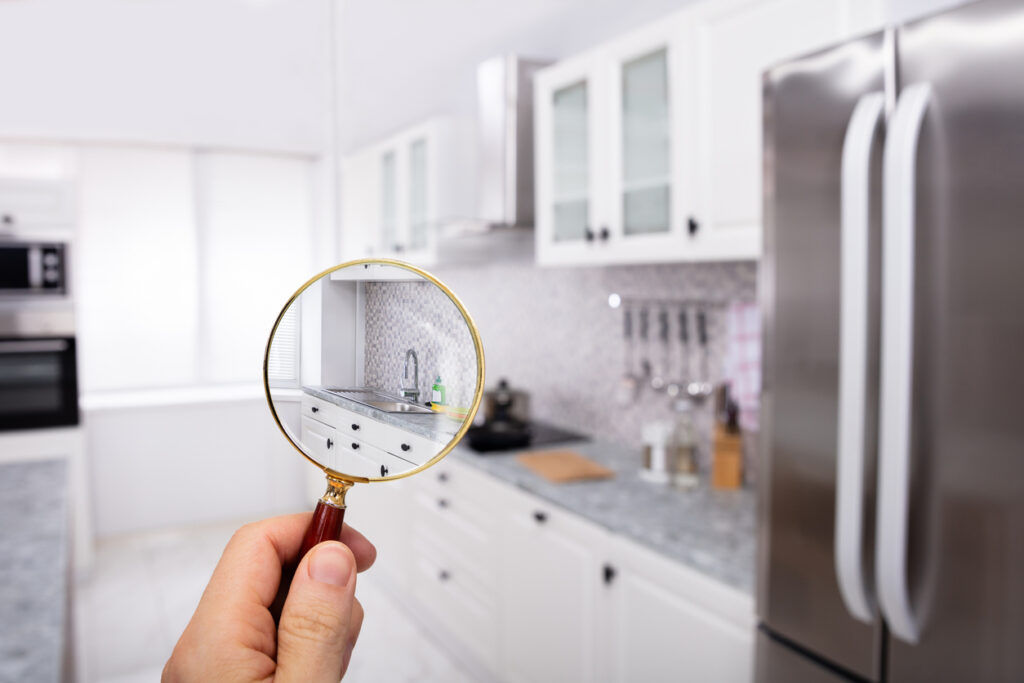- Don’t Get Distracted by Staging
- Check for Water Issues
- Notice Any Strong Smells
- Watch for Random Paint Touch-Ups
- Look for Cracks or Uneven Floors
- Test the HVAC and Airflow
- Try the Windows and Doors
- Check for Outside Noise
- Look for Signs of Pests
- Take Notes and Ask Questions
- Check and Check Again
- Never Skip a Home Inspection
Before You Fall in Love With a Home, Check These Things
“Cosmetic updates can draw the eye and create an attraction for a home, but it’s essential to look beyond the pretty fixtures of the home and check the structural integrity,” says Debbie Sagorin, an expert real estate agent.

The first time you walk through a house, it’s often an exhilarating experience. It could be the freshly painted walls, the relaxing background music, or the way the sunlight hits the kitchen counters. When you’re walking through a home, trying to envision yourself living there, the place may feel new and a little bit special. Love for the house may cloud your vision and cause you to overlook key issues. This house could have any number of things wrong with it. Therefore, it’s essential to take a step back before you fall in love with a home and check these things.
You will find it helpful to look past the fluff and focus on what really matters when you are touring a home. This guide will help you identify key areas of the home to determine its integrity.
Don’t Get Distracted by Staging
The cozy throws and picture-perfect dining table aren’t staying (unless you negotiate for them). Staging is meant to help you feel at home, but your job is to look past that.
Ask yourself: Would my furniture fit here? Is there enough space for the way I actually live? Can you walk around the bed without bumping your knees? It’s okay to picture yourself living there, as long as you do it with your eyes open.
>>MORE: Home Inspection Checklist
Check for Water Issues
One of the costliest problems a house can have is water damage. The seller should tell you about leaks or floods, but some sellers don’t see those as problems worth mentioning in the Seller Disclosures. So it’s best to examine the home yourself and do your own research.
Here are some signs to look for water issues:
- Stains on ceilings or walls
- Floors that seem to be warping or undulating
- Bubbling paint
- Any areas that seem to have a persistent dampness to them
Notice Any Strong Smells
If the home exudes the aroma of a fancy spa or seems to have every Bath & Body Works candle lit, stop and think for a second. A strong “fresh linen” scent might simply be the owner’s preference. However, it could also be trying to cover up odors of a not-so-fresh variety.
Strong scents from a candle or air freshener could be covering up scents from family pets who use the indoors as their personal bathroom. Even more concerning, the strong smells could be attempting to conceal mold or smoke smells. Pay attention to the scents underneath the air freshener, and take close notice in rooms farther away from the scent. While looking around, check the home for any damage or cause for a coverup.
Yes, try to focus on breathing normally.
>>DISCOVER: How to Get Rid of Old House Smell
Watch for Random Paint Touch-Ups
It’s common to refresh your home with a new coat of paint when putting a house on the market. However, if only one part looks newly painted, maybe a wall in the living room or a patch on the ceiling, it could be that the homeowner is covering up a water stain, a crack, or something even worse.
Ask the listing agent about it. If the answer is vague, remember to point that out to your home inspector and have it examined.
Look for Cracks or Uneven Floors
Usually, hairline cracks in drywall are merely cosmetic, particularly in older houses. However, wide or diagonal cracks in walls, on the patio, or across the driveway could indicate a lot of movement or structural problems. Pay close attention to them.
Test the HVAC and Airflow
With the agent’s permission, switch on the heating or cooling system and check the home’s airflow. Does the airflow come out evenly? Are some rooms too loud and some too quiet? If the house has multiple floors, is each level at a comfortable temperature? If the house temperature raises any red flags, it could be an HVAC issue or an issue of insulation.
In addition, check the venting fans. Do the fans work in the bathrooms? Are there even any fans in the bathrooms? Any kind of poor ventilation can lead to all sorts of problems later.

Try the Windows and Doors
Every window and door must be opened and shut during your home inspection, but you may as well open one or two now. They must be checked for ease of movement, smooth operation, and to see if they lock easily.
Foggy windows can indicate broken seals. A front door that sticks can mean any number of things, none of which are good: a warped doorframe, a shifting foundation, or simply a door that’s too heavy. If they’re not operating the way they’re supposed to, you or the seller will be spending money to fix the problem sooner or later.
>>LEARN: Home Buying 101 Guide
Check for Outside Noise
You might be amazed at how many buyers neglect to check the surrounding noise levels. Pay attention to the noise level inside the home with the windows closed and open. Also, go outside and listen. Determine if the surrounding noises are something you can live with.
Furthermore, if the house you’re considering faces a really busy road, train tracks, a freeway, or a school, take extra time to listen to the noises. Figure out if you’re willing to overlook the additional noise. Oftentimes, homes close to busy streets or trains will be more affordable. This tradeoff may be worth it.
In addition, visit the home at different times of the day. Some sellers attempt to arrange showings for their houses during quieter parts of the day to make them seem as calm as possible.
If your potentially new neighbor is quiet all day, but frequently hosts loud parties at night, this is something you’ll want to know.
Also, try going back during rush hour. What might seem serene at 12:00 noon might sound totally different at 7:00 AM on a Wednesday.
Look for Signs of Pests
Look for signs of pest infestations, like droppings or holes in the patio cover. If you notice pest traps behind a piece of living room furniture, that might be a reason to have a pest inspection if you go ahead with an offer and are accepted.
If you have lingering questions about potential pests, ask the inspector and the selling agent to thoroughly check the home. Additionally, look at the Seller Disclosures. Were pest issues mentioned in the Seller Disclosures? When was the last time this house saw a pest inspection or treatment (especially for termites)?
Take Notes and Ask Questions
If you’re going to be touring more than one home, simply memorizing everything won’t work. Take along something to write with, and do some creative composing. You’re going to want to note any and every detail that struck you as noteworthy (in a good or bad way), including if/when you encountered a layout that had you thinking, “This is so right for us!” or “Ummm, definitely not our home…..”
After each and every tour, you’re going to want to ask the listing agent.
- How long has the home been on the market?
- Have any recent price alterations or shifts occurred?
- Are Seller Disclosures accessible?
Check and Check Again
If you’re serious about a property, visit it at different times. Go back at a different time of day. Morning sunlight, evening shadows, or nighttime traffic can change your opinion.
A tape measure is a good tool to have on hand. Does your sectional fit? Will your king bed leave room to walk? Discovering the answers to these questions is better done now, before move-in day.
Ignore superficial improvements. Having fashionable furnishings and fixtures is great, but it is far more important to pay attention to the major systems of a house: the roof, plumbing, HVAC, and electrical systems.
Never Skip a Home Inspection
Never skip the home inspection. Not even if the house seems clean as a whistle. A pro inspector will ferret out problems that could cost you dearly later. The inspection gives you leverage to ask for even minor repairs or a seller credit. If the house is really a lemon, don’t hesitate to walk away and find a better one.
Think of the inspection as cheap insurance before you really commit to a major purchase. I always tell my buyer clients that they’re buying a non-refundable item. It’s essential to check your home for flaws.
Also, keep in mind that the listing agent works for the seller. Unless you have a written buyer/broker agreement with them, their job is to work for the seller and get the best deal for them, not for you.
Make sure you have an expert real estate agent on your side working for you. Before you begin your home search, interview several agents and determine who has the necessary skills to spot issues with properties, ask the right questions, and negotiate on your behalf.





